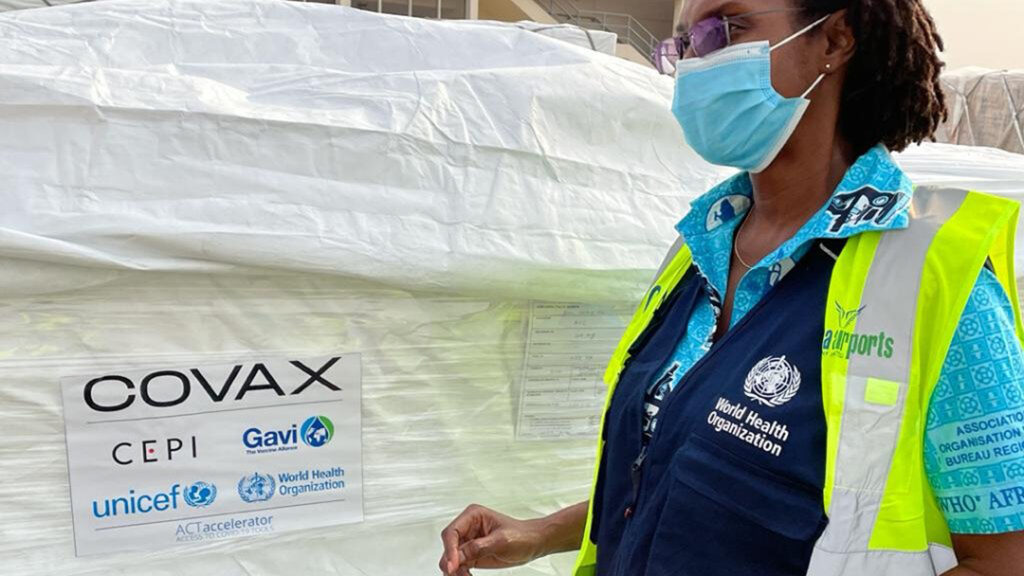ADF STAFF
Ghana and Côte d’Ivoire became the first two nations in Africa to receive COVID-19 vaccinations through the international COVAX program when shipments touched down in their capitals at the end of February.
The deliveries of AstraZeneca vaccine doses are part of an international effort to ensure that Africa does not fall behind the rest of the world in the fight to stop the spread of the global pandemic.
Through COVAX, African leaders plan to provide at least 600 million vaccinations by the end of this year. Ghana and Côte d’Ivoire are the first of 23 countries on COVAX’s list. The World Health Organization (WHO) expects to have 90 million doses in circulation by June.
The African Union, through its COVID-19 African Vaccine Acquisition Task Team (AVATT), is working on its own program to bring another billion doses to the continent with the help of the African Export-Import Bank. In January, AVATT secured the first portion of those vaccines — 270 million doses — that it has allocated to more than a dozen countries that have signed on with the program.
Certain countries continue to pursue vaccines on their own, in addition to participating in AVATT and COVAX. South Africa, for example, began vaccinations in mid-February with 80,000 doses of Johnson & Johnson’s single-shot vaccine. According to President Cyril Ramaphosa, the country has secured 9 million doses in total.
WHO officials say COVAX shipments are going out when the doses and the countries are ready.
“We’re not choosing countries. We’re taking countries in the order in which they’re prepared and the shipment can go,” Dr. Bruce Aylward, senior advisor to WHO Director General Tedros Adhanom Ghebreyesus, said during a news conference on March 1.
More than half the countries on the continent should have vaccination programs underway in the coming weeks, according to Dr. Matshidiso Moeti, the WHO’s regional director for Africa.
“While celebrating this feat of solidarity, there is still a tremendous need for more investment in vaccine equity,” Moeti said at a recent news conference. “It cannot be stressed enough: No country is safe until all countries are safe.”
Dr. John Nkengasong, director of the Africa Centres for Disease Control and Prevention, said health care workers are being trained to administer the vaccine.
“That will get us started in Ghana,” he said during his weekly COVID-19 update on February 25. “We will continue in the next few weeks.”
Ghana received 600,000 doses from COVAX. Vaccinations began March 2 with President Nana Afuko-Addo receiving the first shot. The current round of vaccinations will focus on frontline health workers and people over 60, said Dr. Franklin Asiedu-Bekoe, director of public health for the Ghana Health Service.
“The start in Ghana is part of a rolling process,” said Richard Mihigo, who leads immunization and vaccine development for the WHO’s Africa region.
Ultimately, Ghana plans to vaccinate two-thirds of its 31 million citizens, Asiedu-Bekoe said during a WHO press conference in late February.
“We are very much reliant on the COVAX facility,” he said.
As African nations receive more doses of vaccine, public health officials face their next challenge: getting people to take it.
A continentwide survey by the Africa CDC showed 18% of the respondents believed that vaccines in general are not safe, and 25% of those surveyed had doubts about the safety of the COVID-19 vaccine. Most of those rejecting the vaccine are the victims of misinformation.
The same survey found a wide range in the percentages of people willing to take a vaccine, from a high of 94% in Ethiopia to a low of 59% in the Democratic Republic of the Congo.
Moeti urged people to put their doubts aside to protect themselves and their communities.
“This is a moment to seize when your turn comes to receive the vaccine,” Moeti said. “The vaccines have been thoroughly looked at. The data is sufficient in terms of safety. Let’s take this opportunity so that we put our economies, our health care systems back into normal operation.”

